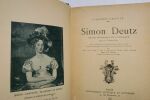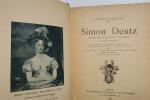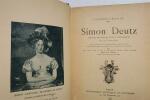35 books for « deutz »Edit
-
Century
16th (1)
20th (21)
-
Topics
Bible (1)
Exegesis (5)
Hackney (2)
Latin (22)
Liturgy (4)
Religions (1)
Theology (21)
-
Countries
Belgium (27)
Denmark (1)
France (7)
-
Syndicate
ILAB (3)
SLAM (2)
"ABBATIS, RUPERTI. (RUPERT OF DEUTZ) (+) JOHANNES COCHLAEUS (edt.).
Reference : 60875
(1527)
Summi disertissimi theologi, sacris dutaxat literis omnia probantis, in XII. prophetas minores, commentariorum libri XXXII. (...).
Cologne, Fran. Byrckman (Birckmann), 1527. Folio (310 x 210 mm). In a lovely contemporary full calf binding with four raised bands and blindtooled boards and spine. Paper title-label pasted on to spine. Outer margin of boards with traces from clasps. Author and title in contemporary hand to fore-edge. Title-page with Birckmann's two-part printer's mark showing his initials in the right medallion with the motto ""Fortuna cum blanditur tunc vel maxime metuenda est"" (When Fortuna flatters, she is the most to be feared"") and in the left medallion showing a hen and chicks, which was also on Birckmann's House in Cologne. Annotation in neat contemporary hand to pasted down front end-paper, title-page, and occasionally in margins. Leaf N3 with small loss of paper in margin, not affecting text. Vague dampstain in upper margin and lower outer margin of last leaves, but generally a very nice and clean copy. (2 blanks), (5), CCXLII, (3 blanks) ff. Leaf B4 erroneously paginated as VII instead of X. Complete.
Editio princeps of Rupert of Deutz' commentaries on the Book of the Twelve Prophets edited by the influential Luther opposer Johannes Cochlaeus (1479-1552). “Rupert of Deutz (ca. 1075-1129) is widely recognised as one of the most prolific writers of the Middle Ages. Along with other Church Fathers such as Augustine of Hippo, his work occupies more than three volumes of the Patrologia Latina. During his lifetime, he devoted more than twenty years to tireless commentary on the Scriptures and was involved in many theological debates. His writings touched almost all of the genres of religious literature for that period: numerous biblical commentaries (on all the historical books in the Old Testament, on the twelve Prophets, on the Gospels of Mathew and John, and on the Apocalypse), commentaries on the Rule of St. Benedict, two Lives of Saints and more apologetic works. The fact that his works are preserved in more than 250 manuscripts is a testament to his popularity, especially across the German Empire (and more specifically, the ecclesiastical provinces of Cologne and Salzburg). More than half of these manuscripts date from the middle of the twelfth century, and thereafter his influence appears to have dwindled dramatically. This noticeable phenomenon witnesses the vicissitudes of traditional Benedictine monasticism during the transformative period of the first half of the twelfth century.” (Teng Li, The Holy Spirit in Twelfth-Century Thoughts: Rupert of Deutz (ca 1075-1129) and Anselm of Havelberg (ca 1095-1158). Johannes Cochlaeus, a Deacon of the Church of the Blessed Virgin in Frankfurt, lived in exile in Cologne where he became acquainted with the Abbot of Deutz through his host George Lauer. Cochlaeus learned that certain works of Rupert were to be published by Lutherans in Nuremberg. He strongly opposed and tried to obstruct this effort because the Lutherans had previously struggled to find medieval authors who supported Luther's doctrines. When a book by Rupert was discovered and favored by Lutherans, they sought more of his works. Osiander, a married priest and preacher, added Lutheran ideas to Rupert's writings before their publication. Cochlaeus persuaded publishers Peter Quentell and Arnold Birckmann to print Rupert's works and promised to oversee the edition. As demand grew, Cochlaeus and the Abbot of Deutz gathered more volumes of Rupert's writings from various sources. Rupert of Deutz influenced theologians and thinkers in the medieval period and particularly within the Benedictine tradition. His writings were widely read and respected during his time and in the centuries that followed. Adams R-935.Graesse VI, 193.BM STC German, 1455-1600, P. 762.
OPERA. Quotquot hactenus haberi potuerunt, auctiora & correctiora quam antea. Cum duobus indicibus priore rerum & verborum posteriore locorum S. Scripturae. (Tome 1 seul).
Paris, Charles Chastellain, 1638, 1 pleine basane usagée, 1 mors fendu, coiffes manquantes, plats frottés, in-folio, 1 ff. blanc, f.t., titre (belle marque d'imprimeur, formant un titre frontispice), 9 ff.n.c., 1161 pp., texte sur 2 colonnes, ex-libris manuscrit: "à l'usage des Recollets de Valence", mouillure dans la marge des premiers feuillets ;
Tome 1 seul (complet en 2 tomes).Commentaires sur la Sainte Trinité, les Petits Prophètes et le Cantique des Cantiques.Commentaires sur la Bible, intitulé De la Trinité (De Trinita 1112-1117), parce que les trois parties du livres, qui portent sur les trois parties de la Bible, sont rapportées aux trois personnes divines. C'est la première vision de la Trinité: il s'agit d'un rêve ou les trois personnes apparaissent derrière un autel et dialoguent avec lui. Rupert y rajoute à la demande d'évèques et amis des commentaires sur les douze Petits Prophètes. Commentaires sur le Cantique des Cantiques comme mariologie.Rupert de Deutz, né en 1075, théologien à tendance mystique. Bénédictin à Saint-Laurent de Liège, abbé de Saint-Héribert de Tuy. Mélé aux controverses médiévales sur l'Eucharisite, il fut éloigné de son couvent pour son attachement à la cause pontificale dans la querelles des investitures. Considéré comme l'un des plus important théologien du 12e siècle, il est le fondateur d'une "théologie biblique".Autres formes du nom de l'auteur: Hrodpertus abbas - Rupertus - Robert de Saint Laurent - Robert de Tuy - Ruperto de Deutz.ref. biblio: Brunet
Phone number : 06 80 15 77 01
UN DEPLOIEMENT DE NOUVEAUX FACTEURS DE PUISSANCE - LA PLAQUETTE : GAMME DEUTZ 06
KLOCKNER-HUMBOLDT-DEUTZ AG - KOLN. NON DATE. In-8. En feuillets. Bon état, Couv. convenable, Dos satisfaisant, Intérieur frais. Plaquette ornée de photo et tableau en couleurs dans et hors texte. . . . Classification Dewey : 631-Equipement agricole
Classification Dewey : 631-Equipement agricole
RUPERTUS Tuitiensis Abbas - Rupert of DEUTZ ( author ) - Johannes COCHLÆUS ( editor ) :
Reference : 39094
In XII prophetas minores Commentarii. - RUPERTI AB-/BATIS TUITIENSIS , SUMMI DISERTISSI/miq[ue] Theologi, sacris du[m]taxat literis omnia probantis, in XII prophetas mino-/res, Commentariorum Libri XXXII. Ex ueris primisq[ue] originali-/bus , iterum atq[ue] iterum recogniti, atq[ue] nunc tandem / cum adnotationum ac scripturarum locis, / fideliter primum excusi. / PROPHETARUM ORDO ET LIBRO-/rum numerus. / ....
".: (Coloniae ) ( Köln ), Impensis Fran. Byrckman. Anno.M.D.XXVII. Mense Septembri ( 1527 ) , in-folio, 301 x 198 mm, 242 folios, with 2 circular printer's devices on title, woodcut initials, bound in modern full brown morocco, raised spine, both covers with a central blind-tooled arabesque. (fine binding). Two single small wormholes in blank upper margin of final 8 leaves, light waterstaining on a small area of some leaves ( heavier on the last 10 leaves). Generally a very nice copy. (USTC 691746 ; VD16 B 3835 ; Adams R935). First edition , edited by Johannes Cochlaeus. Rupert of Deutz ( ca. 1075 - + 1129) was born in Liège (actual Belgium). In 1120/21 the archbischop of Cologne Friedrich von Schwarzenberg made him abbot of the Sankt-Heribert abbey at Köln-Deutz. Rupert wrote a total of 42 commentaries on the bible which made him the most important theologian of the Benedictine order at that time and also the most prolific author of his age. Many of his commentaries where enriched with new insights on points which were not touched since Saint-Augustine. His influence lasted well into the 16th century ( e.g. Petrus Canisius)."
Habsburg Emperor Charles VI - M. T. van ELSEN ( magistrate of Antwerp ) - Guillaume Gedeon DEUTZ ( bond issuer ) :
Reference : 44947
Original manuscript letter from the Magistrate of Antwerp, addressed to the Governor of the Austrian Netherlands, containing a petition to the emperor Charles VI for the repayment of a Duch loan written out by Guillaume Gedeon Deutz. Undated, with the original holograph signature of M.F. van Elsen.
".: 2. S.l. (Antwerpen), manuscript on paper, written in ink, undated ( ca. 1750), in-folio, 8 pp , written in French, very neat handwriting. In this letter signed by F. van Elsen, as representative of the Magistrate of Antwerp, and addressed to '' Son Altesse Roiale'' is contained a 5 pp long petition to the emperor with the request of a repayment of loan subscribed by Antwerp business men to Guillaume Gedeon Deutz ( a onetime mayor of the city of Amsterdam). The loan was given an imperial consent with a ''depêche'' from december 22nd 1733 and garanteed by the state of Silesia ( at that time part of the Austrian Empire, but now conquered by Fredrick of Prussia). Provenance; from the archives of Charles de Proli ; photostat of a typed letter from 23 May 1945 refers to Theophile Smekens who was still occupied with Proli's bancruptcy in the late 19th c. ( see Denucé, Antwerps Archievenblad 2e reeks, 7 , 1932 nr.1). We have other archive records relating to Charles Proli and the ''Société Impériale de Trieste pour le commerce Aziatique'' on offer. If you would be interested in acquiring several documents a more advantageous price will be applied. Please inquire via e-mail.."
MANUEL D'INSTRUCTRIONS / Identification et fonction des organes de coonduite et de surveillance , mise en marche du tracteur, siège de conducteur réglable, equipement pneumatique, Voir variable, Conservation du tracteur, Tableau de l'entretien préventif
KLOCKNER-HUMBOLDT-DEUTZ AG - KOLN. NON DATE. In-8. Broché. Etat d'usage, Couv. légèrement passée, Agraffes rouillées, Intérieur frais. 70 pages agrafées - Nombreuses figures en noir et blanc dans et hors texte + 1 ticket + plaquette plan des cables. . . . Classification Dewey : 631-Equipement agricole
Identification et fonction des organes de coonduite et de surveillance , mise en marche du tracteur, siège de conducteur réglable, equipement pneumatique, Voir variable, Conservation du tracteur, Tableau de l'entretien préventif Classification Dewey : 631-Equipement agricole
RUPERTUS TUITIENSIS [RUPERT VON DEUTZ] (& HAACKE H. O.S.B., ed.)
Reference : R67803
(1967)
Ruperti Tuitiensis Liber de divinis officiis [in: Corpus Christianorum. Continuatio Mediaevalis, 7]
Turnhout, Brepols 1967 lvii + 477pp. + 2 plates in colour out-of-text, 25cm., in the series "Corpus Christianorum Continuatio Mediaevalis" volume VII (7), publisher's hardcover binding in red cloth with gilt lettering, ISBN 2-503-03071-5 [introduction in German, text in Latin], very good condition, weight: 1.1kg., R67803
RUPERTUS TUITIENSIS [RUPERT VON DEUTZ] (& HAACKE R. O.S.B., ed.)
Reference : R67805
(1969)
Ruperti Tuitiensis Commentaria in evangelium Sancti Iohannis [in: Corpus Christianorum. Continuatio Mediaevalis, 9]
Turnhout, Brepols 1969 xv + 834pp. + 1 plate out-of-text, 25cm., in the series "Corpus Christianorum Continuatio Mediaevalis" volume IX (9), publisher's hardcover in cloth with gilt lettering, ISBN 2-503-03091-5 [introduction in German, text in Latin], very good condition, weight: 1.7kg., R67805
RUPERTUS TUITIENSIS [RUPERT VON DEUTZ] (& HAACKE H. O.S.B., ed.)
Reference : R67812
(1971)
Ruperti Tuitiensis De sancta trinitate et operibus eius, I: Libri I-IX [in: Corpus Christianorum Continuatio Mediaevalis XXI, CCCM 21]
Turnhout, Brepols 1971 li + 578pp., 25cm., in the series "Corpus Christianorum. Continuatio Mediaevalis" vol.21, publisher's hardcover binding in red cloth with gilt lettering, Very good, ISBN 2-503-03211-5 [introduction in German, text in Latin], R67812
RUPERTUS TUITIENSIS [RUPERT VON DEUTZ] (& HAACKE H. O.S.B., ed.)
Reference : R67814
(1972)
Ruperti Tuitiensis De sancta trinitate et operibus eius, III: Libri XXVII-XLII [Corpus Christianorum Continuatio Mediaevalis XXIII, CCCM 23]
Turnhout, Brepols 1972 pp.1449-1822, 25cm., in the series "Corpus Christianorum Continuatio Mediaevalis" volume XXIII (23), publisher's hardcover binding in red cloth with gilt lettering, Very good condition, ISBN 2-503-03231-3, text in Latin, R67814
RUPERTUS TUITIENSIS [RUPERT VON DEUTZ] (& HAACKE H. O.S.B., ed.)
Reference : R67816
(1974)
Ruperti Tuitiensis Commentaria in canticum canticorum [in: Corpus Christianorum. Continuatio Mediaevalis, 26]
Turnhout, Brepols 1974 lx + 194pp., 25cm., in the series "Corpus Christianorum Continuatio Mediaevalis" volume XXVI (26), publisher's hardcover binding in orange cloth with gilt lettering, ISBN 2-503-03261-0, [introduction in German, text in Latin], very good condition, R67816
RUPERTUS TUITIENSIS [RUPERT VON DEUTZ] (HAACKE H. O.S.B., ed.)
Reference : R67831
(1979)
Ruperti Tuitiensis De gloria et honore filii hominis super Mattheum (in: Corpus Christianorum, Continuatio Mediaevalis, 29)
Turnhout, Brepols 1979 xxi + 458pp., 25cm., in the series "Corpus Christianorum Continuatio Mediaevalis" volume XXIX (29), publisher's hardcover in orange cloth with gilt lettering, ISBN 2-503-03291-7, (introduction in German, text in Latin), very good condition, weight: 1kg., R67831
RUPERTUS TUITIENSIS [RUPERT VON DEUTZ] (& HAACKE H. O.S.B., ed.)
Reference : R118771
(1971)
Ruperti Tuitiensis De sancta trinitate et operibus eius, I: Libri I-IX [in: Corpus Christianorum Continuatio Mediaevalis XXI, CCCM 21]
Turnhout, Brepols 1971 li + 578pp., 25cm., in the series "Corpus Christianorum. Continuatio Mediaevalis" vol.21, publisher's hardcover binding in red cloth with gilt lettering, ISBN 2-503-03211-5 [introduction in German, text in Latin], text is clean and bright (looks unread), small ex-libris stamp on blanco endpaper and at verso of title page, else in very good condition, weight: 1.3kg., R118771
RUPERTUS TUITIENSIS [RUPERT VON DEUTZ] (& HAACKE H. O.S.B., ed.)
Reference : R118772
(1972)
Ruperti Tuitiensis De sancta trinitate et operibus eius, II: Libri X-XXVI [in: Corpus Christianorum Continuatio Mediaevalis XXII, CCCM 22]
Turnhout, Brepols 1972 pp.579-1452, with frontispiece in colour, 26cm., in the series "Corpus Christianorum Continuatio Mediaevalis" volume XXII (22), publisher's hardcover binding in orange cloth with gilt lettering, small stain on upper edges, text and interior are clean and bright, small ex-libris stamp on blanco endpaper and at verso of title page, good condition, text in Latin, weight: 1.7kg., R118772
RUPERTUS TUITIENSIS [RUPERT VON DEUTZ] (& HAACKE H. O.S.B., ed.)
Reference : R118773
(1972)
Ruperti Tuitiensis De sancta trinitate et operibus eius. Libri XXXIV-XLII. De operibus spiritus sancti [in: Corpus Christianorum. Continuatio Mediaevalis, 24]
Turnhout, Brepols 1972 pp.1823-2222, 25cm., in the series "Corpus Christianorum Continuatio Mediaevalis" volume 24, publisher's hardcover binding in orange cloth with gilt lettering, small ex-libris stamp on blanco endpaper and at verso of title page, text is clean and bright (looks unread), very good, ISBN 2-503-03241-2 [text in Latin], R118773
RUPERTUS TUITIENSIS [RUPERT VON DEUTZ] (& HAACKE H. O.S.B., ed.)
Reference : R118775
(1974)
Ruperti Tuitiensis Commentaria in canticum canticorum [in: Corpus Christianorum. Continuatio Mediaevalis, 26]
Turnhout, Brepols 1974 lx + 194pp., 25cm., in the series "Corpus Christianorum Continuatio Mediaevalis" volume XXVI (26), publisher's hardcover binding in orange cloth with gilt lettering, text is clean and bright (looks unread), small ex-libris stamp on blanco endpaper and at verso of title page, ISBN 2-503-03261-0, [introduction in German, text in Latin], very good condition, R118775
RUPERTUS TUITIENSIS [RUPERT VON DEUTZ] (& HAACKE H. O.S.B., ed.)
Reference : R118792
(1967)
Ruperti Tuitiensis Liber de divinis officiis [in: Corpus Christianorum. Continuatio Mediaevalis, 7]
Turnhout, Brepols 1967 lvii + 477pp. + 2 plates in colour out-of-text, 25cm., in the series "Corpus Christianorum Continuatio Mediaevalis" volume VII (7), publisher's hardcover binding in red cloth with gilt lettering, ISBN 2-503-03071-5 [introduction in German, text in Latin], text is clean and bright, small ex-libris stamp on blanco endpaper and at verso of title page, good condition, weight: 1.1kg., R118792
RUPERTUS TUITIENSIS [RUPERT VON DEUTZ] (& HAACKE R. O.S.B., ed.)
Reference : R118797
(1969)
Ruperti Tuitiensis Commentaria in evangelium Sancti Iohannis [in: Corpus Christianorum. Continuatio Mediaevalis, 9]
Turnhout, Brepols 1969 xv + 834pp. + 1 plate out-of-text, 25cm., in the series "Corpus Christianorum Continuatio Mediaevalis" volume IX (9), publisher's hardcover in cloth with gilt lettering, ISBN 2-503-03091-5 [introduction in German, text in Latin], text is clean and bright (looks unread) small ex-libris stamp on blanco endpaper, very good condition, weight: 1.7kg., R118797
 Write to the booksellers
Write to the booksellers














